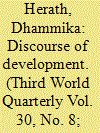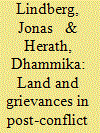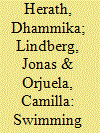| Srl | Item |
| 1 |
ID:
092924


|
|
|
|
|
| Publication |
2009.
|
| Summary/Abstract |
Like most other concepts in the social sciences, 'development' does not entail a commonly agreed upon meaning, context or programme of action. It is defined in different ways depending on the time, space, context, professional and organisational interests of the one who does the business of defining. The meaning of development has also undergone a remarkable transformation over the course of history from the Enlightenment concept of 'Progress' to encompass a great variety of human needs. This paper analyses how the contemporary discourse of development has reached a mature state and how it enables us to understand development in context- and culture-sensitive ways. It is now possible to determine what development means in different settings, and how to bring in material and non-material prosperity to people living in different contexts and cultures. After a theoretical discussion an empirical study in Sri Lanka is presented which attempts to arrive at a more refined context- and culture-sensitive definition of development. The paper argues that, in order to understand development at micro-settings, it is better to construct our own indexes of development rather than using global measures. It shows how the current state of the discourse of development can lend insights into construction of a development index.
|
|
|
|
|
|
|
|
|
|
|
|
|
|
|
|
| 2 |
ID:
134296


|
|
|
|
|
| Summary/Abstract |
There is a growing academic literature on both land and corruption in relation to post-conflict peace building. This paper aims to understand what role corruption complaints play in the nexus between land and grievances in post-conflict societies. Drawing on field material collected in Sri Lanka, the paper interrogates the role of corruption complaints in relation to a number of highly politicised and ethnicised post-conflict land issues, ranging from the return of idps and alleged new resettlement schemes to land grabbing for military, ‘development’ and/or commercial purposes. The comparatively high visibility of land use, and the fact that land-related corruption is likely to affect a specific set of people who lay claim to the land, makes it a particularly important area to address in research on corruption and post-conflict peace building.
|
|
|
|
|
|
|
|
|
|
|
|
|
|
|
|
| 3 |
ID:
167248


|
|
|
|
|
| Summary/Abstract |
Corruption is endemic, pervasive and embedded in the very fabric in social life in some societies, although its degree varies case to case. Previous academic research and anti-corruption watchdogs have examined corruption in Sri Lanka, where corruption is perceived to be pervasive and endemic but, existing studies are inadequate to explain why corruption occurs and anti-corruption continues to fail in Sri Lanka. In our study, we use the contrasting perspectives of ‘collective action problem’ and the ‘principal-agent’ framework to analyse the dynamics that cause and maintain corruption in Sri Lanka as well as the obstacles and possibilities that people fighting corruption are experiencing. We address this aim in a novel way: our observations and fieldwork in Sri Lanka got us in contact with individuals who made concerted efforts to reveal and oppose corruption at different levels; we call them ‘corruption fighters’. We argue, through the insights from corruption fighters, that corruption represents a ‘collective action problem’ and that to understand why corruption fighters still choose to oppose it, they need to be situated within a discourse of corruption and close attention must be paid to personal motivations and the way they construct meaning in the fight against corruption.
|
|
|
|
|
|
|
|
|
|
|
|
|
|
|
|